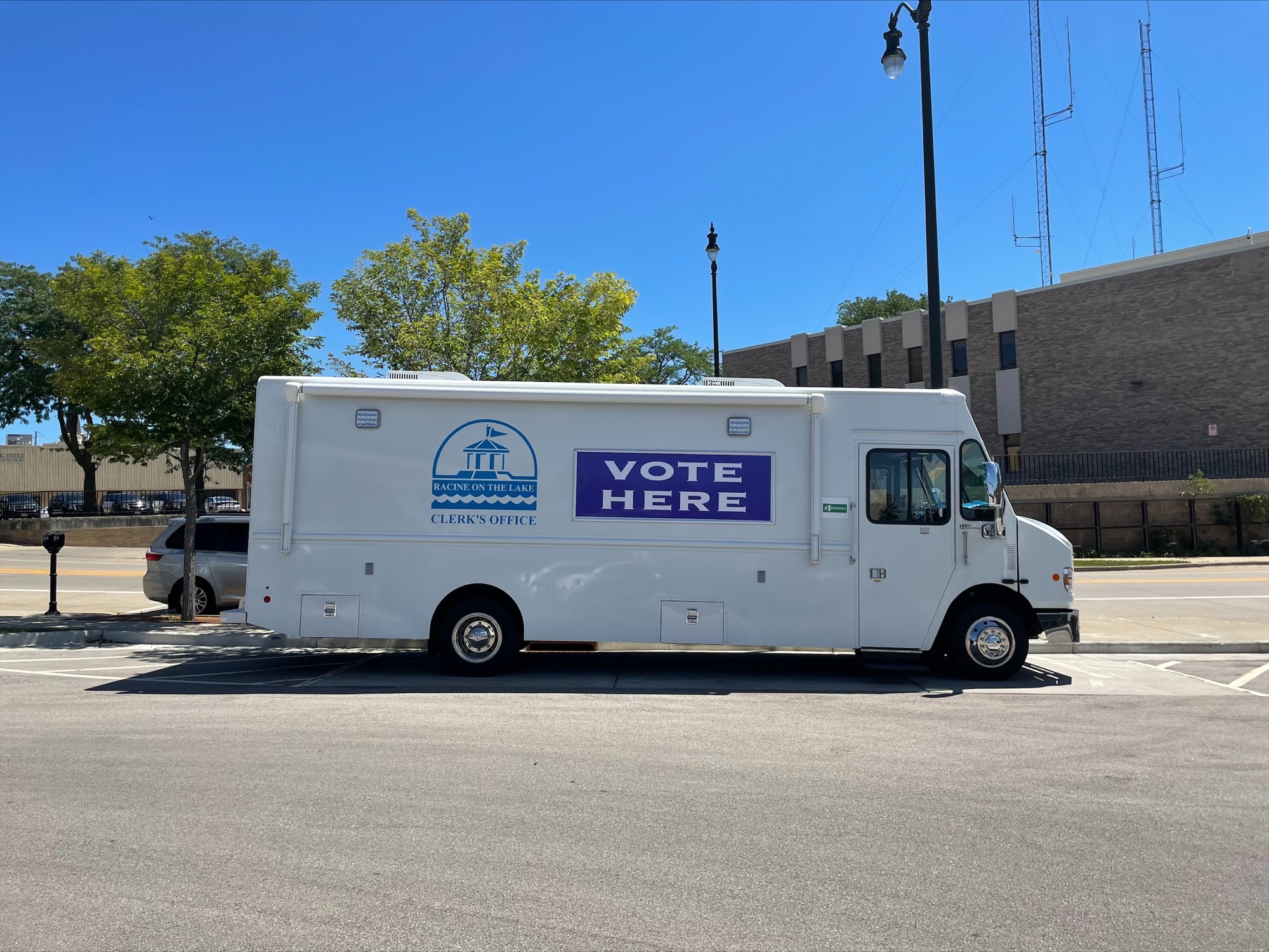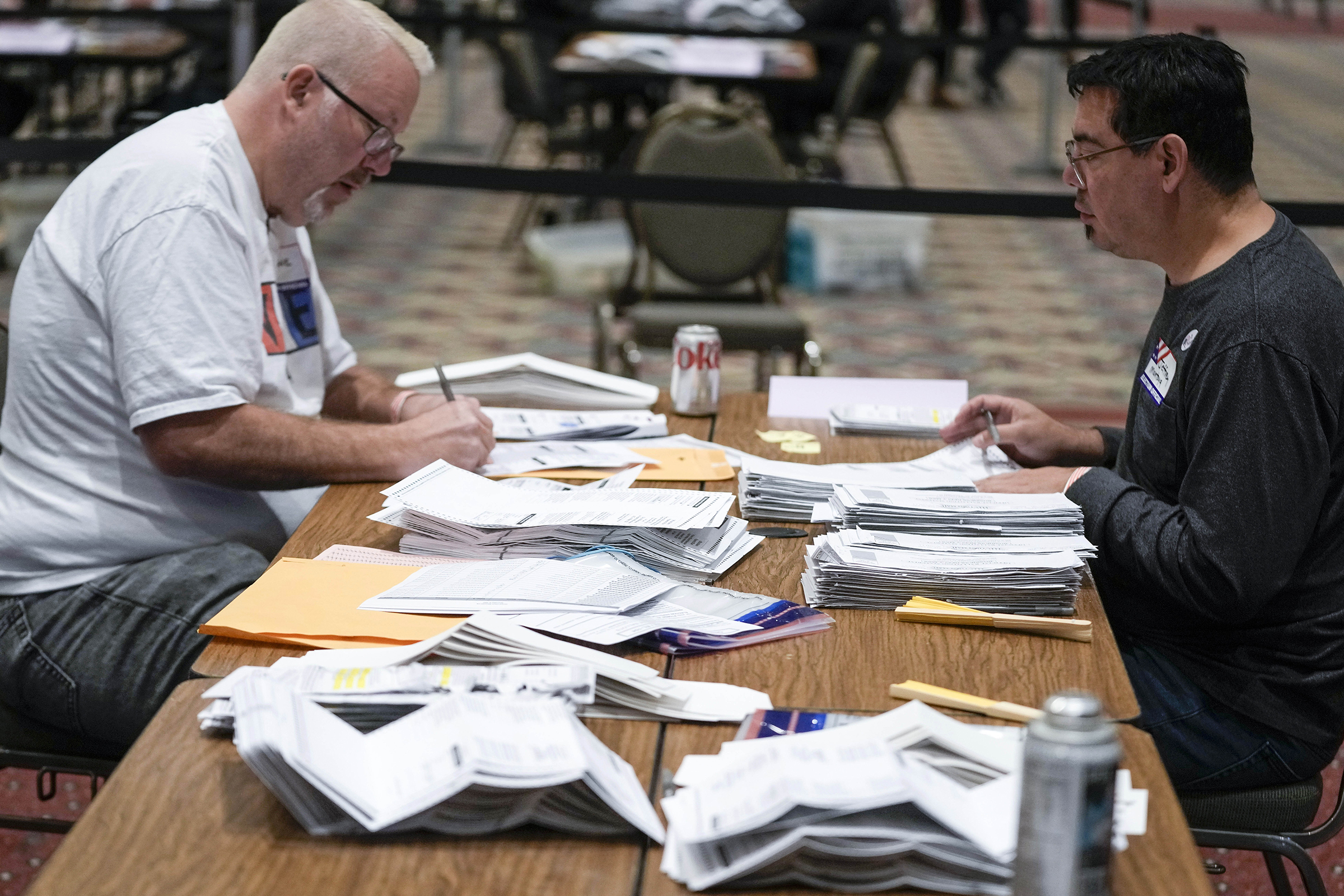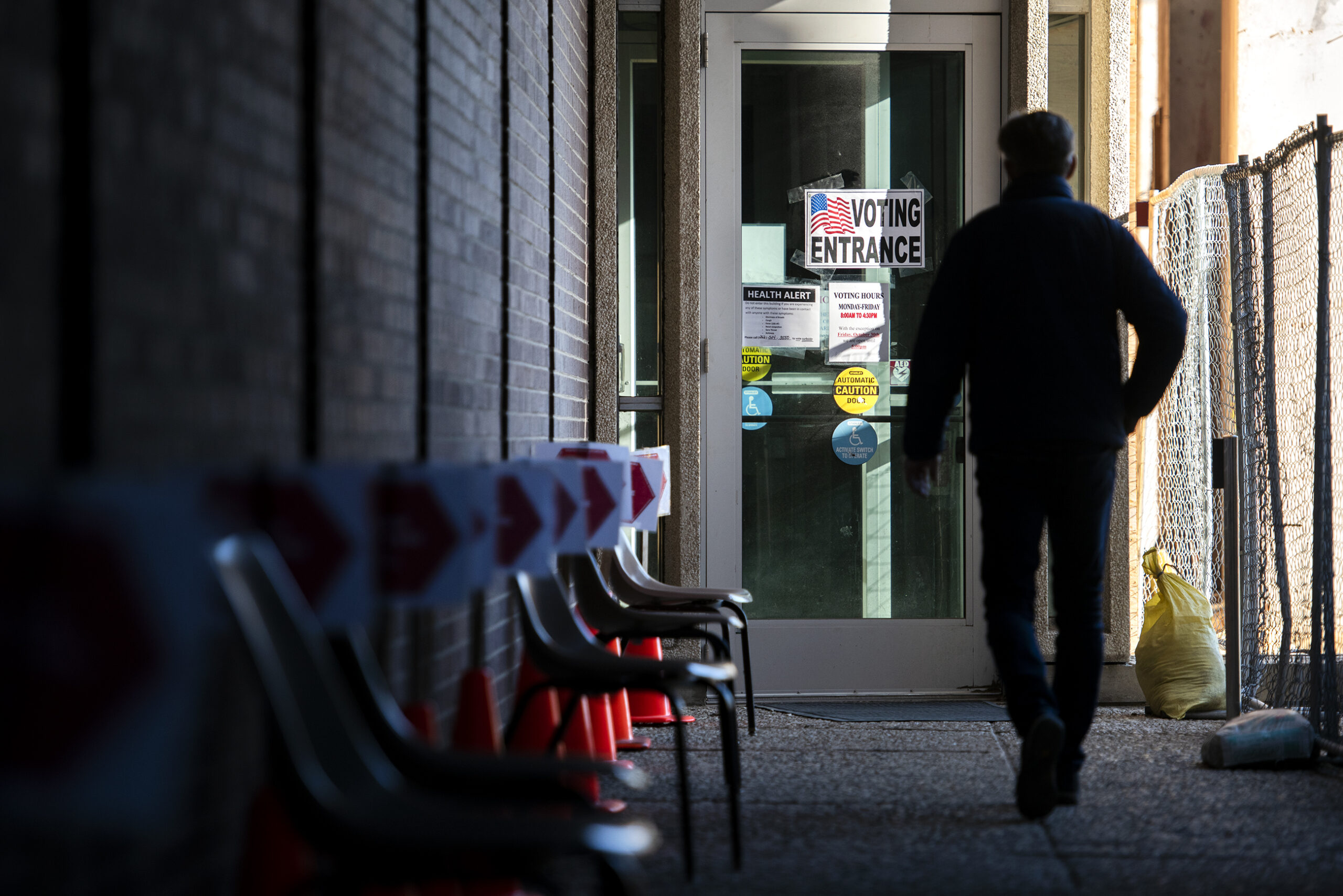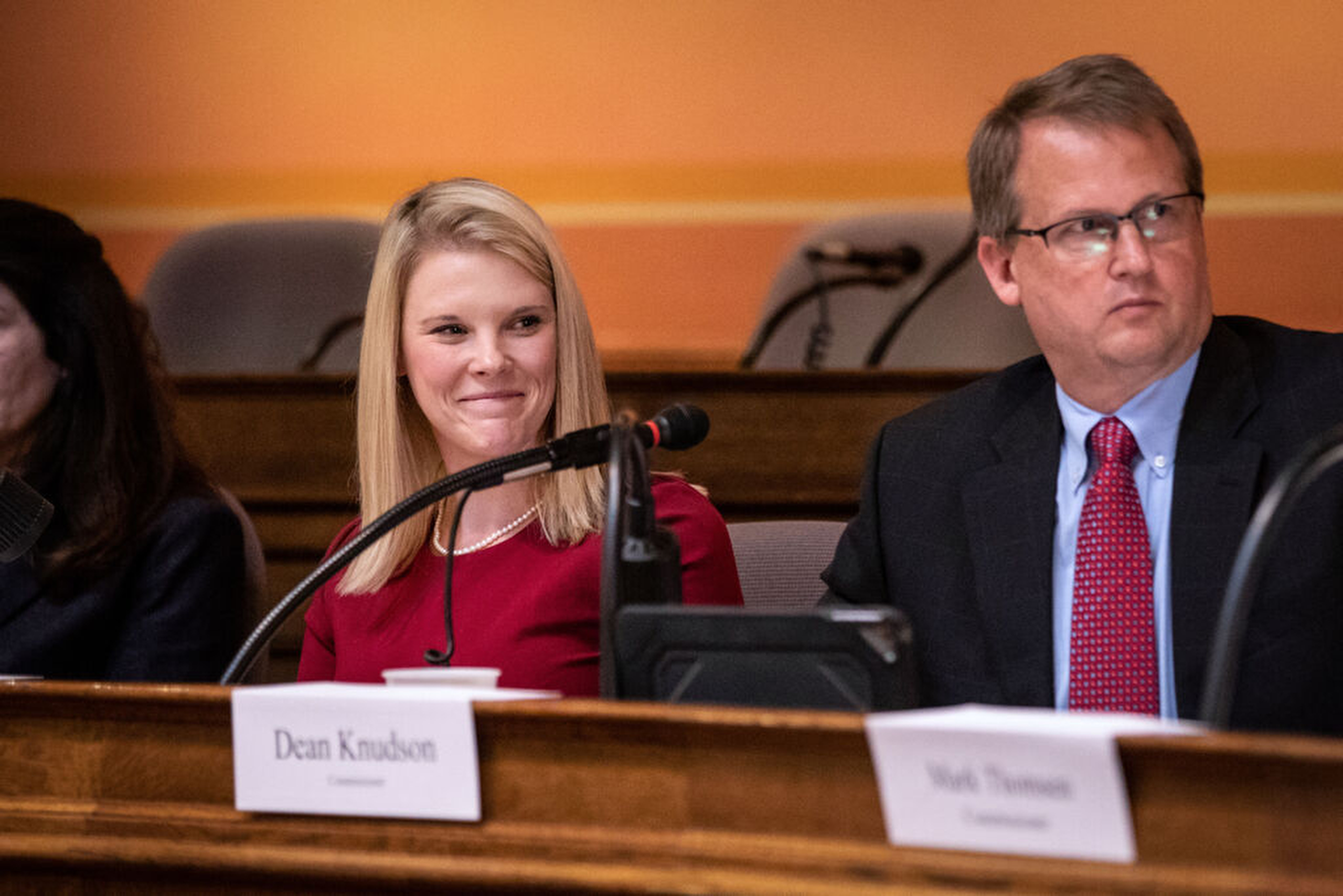The Wisconsin Supreme Court heard oral arguments Tuesday in two election-related lawsuits — one case focusing on the legality of a mobile-voting van, the second looking at whether court records determining a voter is incompetent should be public record.
Brown v. Wisconsin Elections Commission
In 2022, Racine County Republican Party Chair Ken Brown filed a lawsuit alleging the city’s use of a large van as an alternate in-person absentee voting site violated state law. The van, known as a “mobile voting unit,” was used for in-person absentee voting.
Stay informed on the latest news
Sign up for WPR’s email newsletter.
In the lawsuit, Brown argued the mobile voting site violated the law, in part, because it could give an advantage to one political party over another based on where it’s parked.
But overshadowing Brown’s arguments on the merits of his case Tuesday were questions from justices about whether he had legal standing to sue in the first place.
Wisconsin Elections Commission Attorney Gabe Johnson-Karp said the court should dismiss the case because Brown didn’t suffer “an injury in fact” by simply witnessing the voting van in action.
Liberal Justice Janet Protasiewicz asked if Brown doesn’t have standing to challenge the van, “who does?”
“Your Honor, I think it would likely be somebody who is unable to access absentee voting because of the use of the mobile voting unit,” Johnson-Karp said.

Conservative Justice Brian Hagedorn was skeptical. By that argument, he said, “the vast majority of alleged election irregularity claims” would face “no judicial review.”
Regarding the van’s potential of giving one party a partisan advantage over another, Brown’s attorney Lucas Vebber of the conservative Wisconsin Institute for Law and Liberty said clerks need to analyze the partisan makeup of voters in wards proposed as alternate voting sites. He said state law also requires alternate sites to be “as near as practicable” to a city clerk’s office, which is considered a neutral location.
“So, the easiest way to do that is to keep it in the same ward. If it’s in the same ward, it would not confer any political advantage or any advantage to a political party, and it would always be as near as practicable,” Vebber said.
Democratic National Committee attorney Charles Curtis, who argued alongside attorneys or the city and the elections commission, told justices the Racine city clerk parked the van in front of politically neutral locations like libraries and fire stations in order to serve as many voters as possible. He said courts reviewing those decisions should give deference to the city because “local governments know their communities better than circuit judges and this court.”
Conservative Justice Rebecca Bradley wasn’t convinced.
“If the clerk’s decision making in this case, with respect to the mobile election units or anything else, didn’t confer a benefit or an advantage on the Democratic Party, then why are you here?” Bradley asked. “You represent the Democratic National Committee, correct?”
Brown said the DNC intervened in the case because Brown’s argument for placing all alternate voting sites in one of the Racine’s 49 wards “is going to disadvantage all voters, it seems to me, but it certainly has a disadvantage and disadvantageous effect on Democratic voters as well.”
Brown filed his lawsuit after a complaint he filed with the Wisconsin Elections Commission was dismissed. Earlier this year, a Racine County Circuit Court Judge ruled the mobile voting van is illegal under state law. A ruling from the Wisconsin Supreme Court isn’t expected until after the November presidential election.
Wisconsin Voter Alliance v. Secord
The other case heard Tuesday focused on whether guardianship records provided to the Wisconsin Elections Commission when a person has been deemed incompetent to vote should be public record.
The case was filed by the Wisconsin Voter Alliance, which alleges there are people who have been found incompetent by a court who are still voting in elections. The group was founded by Ron Heuer, who was part of former Conservative Wisconsin Supreme Court Justice Michael Gableman’s widely criticized 2020 review of the presidential election in the state.
Alliance attorney Eric Kardaal started his arguments before the court by citing statistics from Dane County. Liberal Justice Jill Karofsky stopped Kardaal and said the case is limited to Walworth County because that was the focus of the group’s suit.
“I’m afraid what you are trying to do is to introduce the fear that there is some sort of illegitimacy going on in the election in the state of Wisconsin, and that concerns me deeply,” Karofsky said.
But the bulk of the discussion before the court focused on two conflicting orders from Wisconsin appeals courts based in Madison and Waukesha.
In April 2023, all three judges on Wisconsin’s Fourth District Court of Appeals ruled a Juneau County Circuit Court properly dismissed Wisconsin Voter Alliance’s records lawsuit. But in December 2023, Wisconsin’s Second District Court of Appeals reversed a Walworth County Circuit Court order dismissing a similar records lawsuit.
Attorney Sam Hall, who represents Walworth County told the court the Fourth District appeals order shouldn’t have been overruled by the Second District judges.
“The truth of the matter is that the District Two court of appeals decision blasts open the door for the personal information of some of the most vulnerable people in our communities to be broadcast, not only to those with noble and good intentions, but to those who might do these folks harm or seek to defraud them,” Hall said.
Justice Karofsky agreed. She said past Supreme Court precedent requires that “if a court of appeals in one district makes a decision, the other three districts need to honor that.” She said she’s not sure how Wisconsin Voter Alliance gets past that error.
“What the people of the state of Wisconsin deserve is a legal code that they can follow, is a legal code that has stability and predictability and doesn’t matter which district you land in, because once a district makes a decision, that is the law until it comes to us,” Karofsky said.
As with the other election case, a decision from the court on the Wisconsin Voter Alliance lawsuit is unlikely to come before the November election.
Wisconsin Public Radio, © Copyright 2025, Board of Regents of the University of Wisconsin System and Wisconsin Educational Communications Board.



